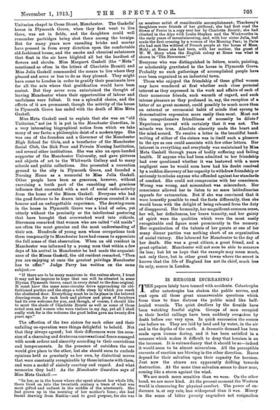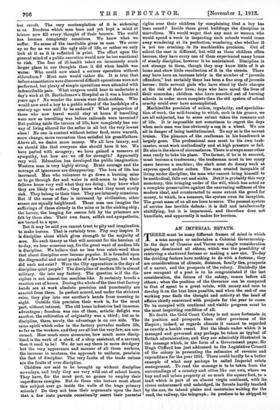IS HEROISM INCREASING ?
THE papers lately have teemed with accidents. Catastrophe after catastrophe has shaken the publics nerves, and rent open all those great unanswerable questions which from time to time distress the public mind like half. healed wounds. The quiet dwellers by the fireside have been watching fearful sights. Groups of men occupied in their lawful callings have been suddenly oveliaken by death before our very eyes. In quick succession the scenes rise before us. They are laid by land and by water, in the air and in the depths of the earth. A dramatic demand has been made upon human daring, and it has been satisfied in a measure which makes it difficult to deny that heroism is on the increase. It is extraordinary that it should be so—indeed it would seem to be almost miraculous. All the perceptible currents of emotion are blowing in the other direction. Races depend for their salvation upon their capacity for heroism. Just now the straws are apparently drifting towards destruction. At the same time salvation seems to draw near, coming like a storm against the wind.
We are much more sensitive than we were. On the other hand, we are more kind. At the present moment the Western world is clamouring for physical comfort. The power of en- durance is, at any rate, less widespread than it was. Misery in the sense of bitter poverty engenders not resignation but revolt. The very contemplation of it is sickening to us. Burdens which men bore and yet kept a mind at leisure now fill every thought of their bearers. The world has become completely conscious. We know what we suffer. No sense of the inevitable gives us ease. We cover up so far as we can the ugly side of life, or rather we only look at it as it is reflected in print. The effect upon the general mind of a public execution would now be too emotional to risk. The fear of ill-health takes an immensely much larger place in our thoughts than it did when health was worse. Who could now stand a serious operation without chloroform ? Most men would rather die. It is true that before anaesthetics were discovered difficult operations were not performed, but plenty of simple operations were attended with indescribable pain. What surgeon could bear to undertake a day's work at St. Bartholomew's Hospital as it was a hundred years ago ? No wonder the nurses were drink-sodden. Who would now send a boy to a public school if the hardships of a century ago were still to be endured ? What proportion of those who now travel would stay at home if travelling were now as travelling was before railroads were invented ? But putting aside the terrors of life, how completely has our way of living altered for the softer in all but the very lowest class ! No one is content without better food, more warmth, more change, more recreation than satisfied his grandfathers. Above all, we desire more money. We all love luxury, and we should like that everyone else should have it too. We have parted with savagery ; we have gained a measure of sympathy, but how are we off for strength ? Apparently very well. Education has developed the public imagination. Western man is very highly strung. Brute courage and the courage of ignorance are disappearing. The love of life has increased. Men who volunteer to go down a burning mine or to go through fire and water in mid-ocean to help their fellows know very well what they are doing ; they know what they are likely to suffer ; they know what they must surely risk. They belong to their time. They are intensely conscious. But if the sense of fear is increased by civilisation, other senses are equally heightened. These men can imagine the sufferings of those already in the mine or in the sinking ship ; the horror, the longing for rescue felt by the prisoners are felt by them also. Their own fears, selfish and sympathetic, are turned to a spur.
But it may be said you cannot trust to pity and imagination to make heroes. That is certainly true. Pity may inspire. It is discipline alone which gives strength to the majority of men. No such theory as that will account for the heroism of to-day, we hear someone say, for the great want of modern life is discipline. We believe that no less true catch-word than that about discipline ever became popular. It is founded upon the disgraceful and cruel pranks of a few hooligans, but when did such not exist ? Were the City apprentices in the days of discipline quiet people ? The discipline of modern life is almost military. Go into any factory. The question is if the dis- cipline is not almost too machine-like. It certainly breeds a reaction out of hours. During the whole of the time that factory hands are at work absolute precision and punctuality are exacted from them. In perfect accord, and under the strictest rules, they play into one anotber's hands from morning to night. Outside this precision their work is, for the most part, without interest. The old home industries had immense advantages ; freedom was one of them, artistic delight was another, the cultivation of originality was a third ; but as to discipline, there, surely, the advantage is on our side. The same spirit which rules in the factory pervades modern life, so far as the workers, and they are all but the very few, are con- cerned. How much more strenuous, how much more discip- lined is the work of a clerk, of a shop assistant, of a servant, than it used to be! We do not say there is more drudgery but the very appearance and manner of all these workers, the increase in neatness, the approach to uniform, proclaim the fact of discipline. The very faults of the trade unions are the faults of over-discipline.
Children are said to be brought up without discipline nowadays, and truly they are very wild out of school hours, They have, for the most part, no games to employ their superfluous energies. But do those who lecture most about this subject ever go inside the walls of the huge primary schools ? Do they not base their arguments upon the fact that a few irate parents occasionally assert their parental rights over their children by complaining that a boy has been caned ? Inside these great buildings the discipline is marvellous. We would wager that any man or woman who would spend a week in inspecting such schools would come away wondering at its perfection, wondering also whether it is not too crushing in its machinelike precision. Out of school the case is different, but wild as these children often become, they have every one of them experienced many hours of steady discipline, however it be maintained. Discipline is not strange to them, though they may know little of it at home and show little recollection of it in the streets. There may have been an increase lately in the number of "juvenile offenders," but certainly there has been a fine crop of juvenile heroes : little servant girls who have stood by their charges at the risk of their lives; boys who have saved the lives of their comrades ; children who have marched out of burning schools in order more complete than the old system of school cruelty could ever have accomplished.
Machinelike precision of action, regularity, and specialisa- tion of work, the mill-turning to which, each in his groove, we are all subjected, has to some extent taken the romance out of life. It is impossible not sometimes to regret the days when each man was less obviously a cog in a wheel. We are all in danger of being institutionized. To say so is the merest truism. The pleasure of the craftsman in his handiwork is largely gone. The professional man must be his own task- master, must work methodically and at high pressure or fail. He also is the slave of circumstance. There is always some other man ready to take his place. The farmer, if he is to succeed, must become a tradesman; the tradesman must in too many cases become a machine ; the clerk must do dreary work at express speed under orders. The man created incapable of living under discipline, the man who cannot bring himself to be methodical, falls out and sinks. But it is probably this very monotony, this bringing under of the will, which has acted as a complete preservative against the enervating softness of the modern ideal, and counteracted to some extent the greed for money, to which, in a measure, the system owes its inception. The great mass of us all are born to serve. The present system of service has terrible defects : it is dull and intellectually stultifying, but it is impersonal, and therefore does not humiliate, and apparently it makes for heroism.































































 Previous page
Previous page